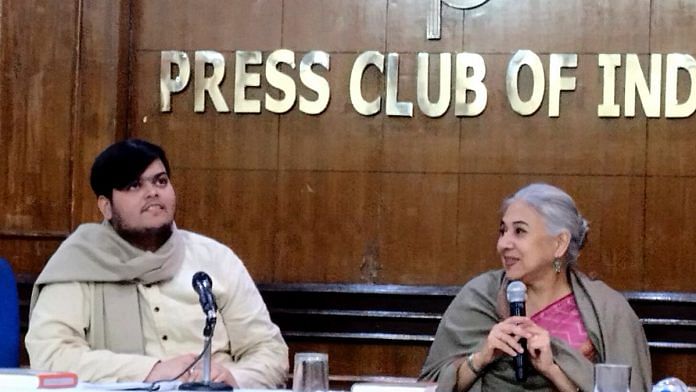The phenomenon of rewriting history in India today brings fear and anxiety—Home Minister Amit Shah recently asked to “fix distorted narrative.” But historian Swapna Liddle thinks rewriting is important.
“Please rewrite history. It’s very important because often many avenues are left unexplored. But leave this rewriting to historians, those with the proper academic tools to do so,” Swapna said during a talk at the Press Club of India on 15 January.
Discussing her latest book, The Broken Script, which talks about the state of Delhi during 1803-1857, she questioned the language used to define the era – “Twilight” and “the age of decay.” She also discussed how the 1857 revolt shaped the perceptions of the era.
Also read: 4 tents, 9 men, one dog—How 2013 brought back border conflict between India and China
Re-examining history
The public and academics often use contradictory terms such as “Twilight,” “age of decay,” and “Delhi’s renaissance” to define the first half of the 19th century, Liddle said. It’s these contradictory views that intrigued her, who began examining them during her PhD at Jamia Millia Islamia in the early 2000s.
While she abandoned her research on the subject after her PhD, in 2019, she returned to the topic. Thus came alive the idea for her latest book The Broken Script.
A Speaking Tiger publication, The Broken Script examines Delhi from 1803-1857, a time when two regimes overlapped – the Mughal Empire and the East India Company. It takes readers on a journey of shifting power dynamics, cultural and intellectual upheaval, the trauma left behind by the revolt of 1857, and more.
In a conversation with Eshan Sharma, heritage activist and founder of a student-led history and heritage promotion initiative Karwaan, Liddle said how the revolt changed the perception of the period predating 1857. It often leads people and sometimes historians too into believing that Delhi was unaffected by colonialism at the time.
“The first books on the period before 1857 were only written three decades after the revolt, in the 1880s, due to the trauma of the revolt. Written by survivors or their descendents, they were often emotional accounts lamenting the loss of an idealised Mughal court,” Liddle said. She added that the transformation and the impact of colonialism on the Mughal court during the period, in its tussle with the East India Company, was entirely lost in these accounts.
In roughly 400 pages, Liddle captures the inner workings of the existing political structures of the time, between a seemingly symbolic authority and a rising military and political power. The book also explores the areas surrounding the changing world of Urdu poetry, the growth of the printing presses leading to the rise of the first modern newspapers in the 1830s, and the establishment of institutions like the Delhi College and the Delhi Archaeological Society, among others.
Liddle, also the convener of the Delhi chapter of the Indian National Trust for Art and Cultural Heritage (INTACH), has written several other books on the city, including Delhi: 14 Historic Walks (2011), Chandni Chowk: The Mughal City of Old Delhi (2017), and Connaught Place and the Making of New Delhi (2018).
Also read: Marx, movies, memories—Saeed Mirza’s book on Kundan Shah, rats and the conspiracy of silence
History made accessible
In an hour-long discussion, the historian also delved into themes such as the circumstances of those being ruled, the role of newspapers, misconception about modernity being a western invention, and the existence of fake news even back in the 19th century.
Commenting on Liddle’s writing, Sharma said that the author had finally made history “accessible” to the people to whom it belongs – the people of Delhi.
(Edited by Tarannum Khan)



